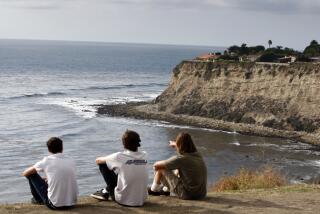San Diego Gets America’s Cup Back, N.Y. Court Rules : Another Loss for New Zealand
- Share via
NEW YORK — A state appeals court today returned the 1988 America’s Cup yachting trophy to the United States, a scathing ruling that vindicated San Diego’s controversial catamaran Stars and Stripes and dealt a blow to New Zealand.
The Appellate Division of state Supreme Court, in a ruling that included one dissenting vote, tossed out a March decision by state Supreme Court Justice Carmen Ciparick.
Ciparick had ruled that the catamaran, which sailed to victory off San Diego in September, 1988, “violated the spirit” of the 138-year-old race, and the judge awarded yachting’s most prestigious prize to New Zealand.
“The court orders that the order so appealed from is reversed,” the appeals court ruled.
Returned to San Diego
The panel of judges voted 4 to 1 in favor of returning the cup to the San Diego Yacht Club, whose Stars and Stripes craft was skippered by Dennis Conner. The cup remains locked in a bank vault in New York where it was stashed by court order last March.
“We’re very happy,” said Tom Mitchell, a spokesman for the San Diego Yacht Club. “We’re hoping everybody will say enough is enough, and we’ll get back on the water and sailing again.”
The next America’s Cup challenge is scheduled off San Diego in May, 1992, and Mitchell said no one will be sailing a catamaran, only single-hulled boats.
“Everybody has agreed they don’t want this to happen again,” he said. “It was not fun. We just hope we can go on and get the luster back to the cup.”
A spokesman from Royal Perth Yacht Club of Western Australia, which lost the 1988 race sailing its 123-foot sloop, was unavailable for comment.
Ciparick based her decision on a vaguely written 1887 Deed of Gift, which loosely defined the rules of competition, including boat design. She ruled the competitors must be “somewhat evenly matched” and ordered the cup forfeited by the catamaran that dared enter a race that traditionally featured only single-hulled vessels.
Scathing Criticism
The appeals court issued a scathing criticism of the lower court’s decision.
It said the term “somewhat evenly matched” is “neither expressed in, nor inferable from, the language of the Deed of Gift.”
“We believe that even if the Deed of Gift were to be construed so as to bar the use of a catamaran in defense of the cup against a mono-hull, the drastic remedy of forfeiture was unwarranted,” the appeals court wrote.
The squabbling began in July, 1987, when Auckland businessman Michael Fay, on behalf of the Mercury Bay Boating Club, ignored modern America’s Cup tradition and demanded a one-on-one match with a San Diego defender.
Fay wanted the race held within one year rather than the usual three to four; he wanted a one-on-one race instead of the usual elimination matches, and he wanted to compete in a boat more than 90 feet long at the water line instead of the usual yachts that are about 45 feet at the water line.
San Diego rejected the challenge, but Fay went to court. When San Diego was ordered to accept the challenge, it also went to an unconventional boat, the speedy catamaran.


